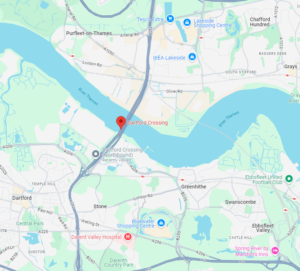Implemented in 2003, the Dartford Crossing charge (Dart Charge) was put in place to cover the cost of building the bridge and was pledged by the government that it would cease after it had been paid for.
Since then, the Dart Charge has caused a significant amount of controversy as drivers are still being made to pay today.
Designed to carry up to 135,000 vehicles per day, the Dartford Crossing has linked Essex and Kent since the 1960s. It acts as a major road crossing of the River Thames, and carries the A282 between Dartford to the south and Thurrock to the north.
On the Dartford Crossings busiest days it has been known to carry up to 180,000 vehicles.
Travelling over the Dartford Crossing can be a key part of many commuters’ journeys, including PCO drivers who make frequent trips across London and its surrounding areas.
Within this comprehensive guide, Rapid PCO will breakdown the current charges for using the Dartford crossing, offer help on how to pay, and provide insights to prevent you from receiving any Penalty Charge Notices (PCNs).
Dartford Crossing charge
How much is the Dartford Crossing charge?
The Dartford Crossing charge varies depending on the type of vehicle you are driving.
For cars, the Dartford Crossing charge is currently £2.50 (£2.00 if you have an account) per crossing, while motorcycles, mopeds, and quad bikes can use the crossing for free.
If you have an account these prices will also be reduced to £2.63 for vehicles with 2 axles and £5.19 for vehicles with more than 2 axles.
The charge applies to each individual crossing, meaning if you travel over the bridge and then come back through the tunnel on the same day, each trip will incur a separate fee.
Paying the Dartford Crossing Charge
How to pay the Dartford Crossing charge?
Before 2014, drivers who used the Dartford Crossing had to stop and pay at a toll booth to pay the fee.
The Dartford Crossing now uses automatic number plate recognition technology (ANPR) that allows you to drive straight through without stopping.
Once you have used the Dartford Crossing you will need to make payment by midnight the day after you cross.
Drivers can pay the Dartford Crossing charge using several convenient methods:
- Setting Up a Dart Charge Account: Register for a Dart Charge account to manage your payments and save money on each crossing.
This is ideal for frequent users as it offers discounts and automatic payments.
You can set up an account online or by post.
Rapid PCO highly recommend setting up and auto pay account to make automatic payments and reduce the risk of receiving any PCNs.
- Paying Online: Visit the official Dart Charge website to make a payment.
This method is quick and convenient, allowing you to pay from anywhere with internet access.
- By Phone: You can call the Dart Charge contact centre at 0300 300 0120.
The service is available every day from 8 am to 8 pm, making it easy to pay over the phone with a debit or credit card.
- At Payzone Retail Outlets: Pay in cash at any Payzone store.
You can find your nearest Payzone outlet on the Payzone website.
- By Post (In advance only): Send a cheque or postal order to Dart Charge Customer Services, PO Box 842, Leeds, LS1 9QF.
Dartford Crossing fine
How much is the Dartford Crossing fine?
If you use the Dartford Crossing between 6am and 10pm and don’t pay the Dart Charge by midnight the next day, you will be liable for a £70 PCN (Penalty Charge Notice). You will also need to pay the original Dart Toll charge fee.
This fine can be reduced to £35 if you pay it within 14 days.
On the other hand, if you fail to pay, the PCN will be increased to £105.
Rapid PCO would like to remind you again to set up an auto pay account to avoid future PCNs and enjoy piece of mind with automatic Dart Charge payments.
When is the Dartford crossing free?
The Dartford Crossing is free to use between 10pm and 6am every day.
Dartford Crossing charges apply from 6am to 10pm year-round, including weekends and bank holidays and Christmas.
Where is the Dartford Crossing?
The Dartford Crossing is a major road crossing over the River Thames.
It connects Dartford in Kent to Thurrock in Essex as part of the A282 road.
It includes two tunnels for northbound traffic and the Queen Elizabeth II Bridge for southbound journeys.
Located just east of London, this crossing is an essential part of the M25 motorway network.

How much does the Dartford Crossing make a day?
According to Thurrock Nub New, figures show the Dartford Crossing Charge reportedly makes more than £200 million per year, and has been ranked the highest earning toll road in the UK.
Based on £215 million, if we divide that by 12, the Dart Charge generates roughly £17,916,666 per month. Dividing this by 4 shows that this can make £4,479,166 per week. Finally, dividing the previous figure by 7, the Dart Charge could be seen to generate around £639,880 per day.
Who owns the Dartford Crossing?
There was a common misconception that a French company owned the crossing because the operator was named Le Crossing until 2009.
However, this company was actually part of Ringway Babtie Ltd, not a French firm Kent Live says.
According to the RAC, National Highways oversees the crossing for the Department for Transport, while Connect Plus Services (CPS) is responsible for its operation and maintenance on behalf of National Highways.
About Rapid PCO
Rapid PCO provide a wide range of London PCO car hire options to meet your needs.
Make the most of our affordable PCO rental vehicles without compromising on quality or service.
With over 11,000 rentals provided, we have established ourselves as a smart choice for PCO drivers in London.
Enquire with a member of the team today by calling 01732 280774 or browse our extensive fleet of standard, hybrid and executive vehicles here.



